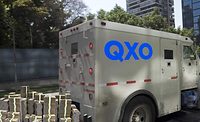In Transition
QXO's AI-Driven Plans for the 'New' Beacon Bldg. Supply
Contractors can expect the good to become better as QXO prepares to assume the reins of the No. 2 roofing and exterior materials supplier
.jpg?1743707846)
Scheduled to close the week of April 28, QXO’s $11 billion acquisition of Beacon aims to revolutionize the roofing and exterior building supply chain. Jacobs, a stickler for branding, has already informed employees that the Beacon brand will be phased out in favor of QXO.
— Bryan Gottlieb/Roofing Contractor | Elements: Adobe Stock, Beacon
Updated 13:13 EDT
Editor's Note: As Beacon transitions to QXO, Roofing Contractor explores the purchase of the second largest roofing distributor and its implications for employees, clients and the industry; this is the second article in the series.
QXO’s $11 billion acquisition of Beacon is poised to reimagine the building-products distribution industry.
 One astute contractor, Ethan Amoni, principal of Reputable Roofing & Siding in the Chicagoland area, remarked that — along with ABC Supply and SRS Distribution — QXO will allow roofing’s “Big 3” to achieve an “alphabet soup trifecta.”
One astute contractor, Ethan Amoni, principal of Reputable Roofing & Siding in the Chicagoland area, remarked that — along with ABC Supply and SRS Distribution — QXO will allow roofing’s “Big 3” to achieve an “alphabet soup trifecta.”
The deal, set to close the week of April 28, marks the first major transaction for QXO under the stewardship of serial dealmaker Brad Jacobs, leveraging his decades-long experience in transforming companies through strategic roll-ups.
Jacobs, whose prior successes include turning United Waste Systems, United Rentals, and XPO Logistics into multibillion‑dollar enterprises, said the acquisition of Beacon represents the foundation of a broader plan to consolidate the $800‑billion building materials market and drive QXO’s annual revenues to more than $50 billion.
“Acquiring Beacon is a key milestone in our plan to create substantial shareholder value,” Jacobs said in a statement, noting how QXO would apply its proven playbook to a platform poised for above‑market growth and margin expansion.
In a recent Bloomberg interview, Jacobs outlined the strategic rationale behind the move.
“We’re gonna roll up building products distribution and roofing in one vertical,” he explained. “I love roofing because when your roof is leaking, you will fix it.”
Jacobs highlighted that roofing is less cyclical than other industries, and he noted the impact of a looming 4-million‑home shortage in the United States as a catalyst for new construction projects.
He also emphasized that QXO’s approach isn’t just about acquisitions; it’s about partnering closely with Beacon’s 8,000‑plus employees to capture their expertise and unlock untapped value.
RELATED
Beacon Employees Imagine Their New Future Under QXO
“We’re buying Beacon for its talented employees,” Jacobs said, underscoring his commitment to preserving and enhancing the company’s human capital.
Presumably, much of the feedback provided by employees was influenced to varying degrees by the relationships within Beacon’s existing client base: roofing and exterior contractors. The inference is that issues where technology could improve outcomes should rise to the top of the suggestion box.
Not His First Rodeo
Jacobs’ blueprint is built on a history of consolidating fragmented industries. At United Waste Systems, he orchestrated a roll-up that achieved a 55% compound annual growth rate by integrating regional waste management firms in remote markets, resulting in streamlined operations and lower costs.
Similarly, his strategy at United Rentals combined rapid acquisitions with an aggressive rollout of new branches, resulting in faster service and improved reliability for customers.
At XPO Logistics, he integrated advanced technology with large-scale acquisitions to enhance supply chain efficiency — a model he has indicated would inform his approach to improving services and gaining efficiencies at Beacon.
Jacobs has a comprehensive strategy to modernize Beacon’s technology stack from the ground up, and the plan begins with the reason he cited for Beacon’s purchase: its human capital.
In his Bloomberg conversation, Jacobs detailed plans to double Beacon’s earnings before interest, taxes, depreciation, and amortization, or EBITDA, through a systematic, employee‑driven process.
“We start by asking every employee two questions — what are you doing really well that we should never change, and what’s your single best idea to improve the company,” he said.
QXO is now analyzing results from the audit conducted among Beacon's rank-and-file, which asked for their opinions on where efficiencies could be gained and pain points could be eliminated to gauge the company's technological strengths and gaps.
“They're the experts on the company, so we want them to have a major hand in what improvements — what changes, what stays the same — in the future,” Joe Checkler, QXO’s senior vice president of communication, explained.
The ‘New Beacon’: Tech-Forward, AI-Inspired
Central to QXO’s future is a robust artificial intelligence initiative. Beacon, a Fortune 500 company with nearly 600 branches across North America and annual net sales approaching $10 billion, brings a formidable platform to Jacobs’ vision of reinventing the building materials sector.
Beacon had already made significant strides in advancing its digital capabilities through its Ambition 2025 plan, first presented in early 2022. That plan aimed to make 25% of its residential and commercial sales digital by the end of 2025.
During the intervening years, digital tools — including Beacon PRO+ and Smart Order — have played a critical role in enhancing the customer experience and driving operational efficiency.
Beacon PRO+ allows contractors to manage their businesses online, place orders, and track project progress with real-time data. The Smart Order tool, powered by EagleView’s aerial imagery, enables fast and accurate material ordering, giving contractors a streamlined way to manage their supply needs.
 Jacobs has taken nearly a half-dozen companies public. [LinkedIn]
Jacobs has taken nearly a half-dozen companies public. [LinkedIn]QXO had already secured a known quantity in AI by hiring Ashwin Rao as the company’s chief artificial intelligence officer even before Beacon was the shiny object catching Jacobs’ attention.
“Artificial intelligence will permeate everything we do at QXO, including demand forecasting, inventory management and e-commerce,” Jacobs said last November of Rao’s hire. “Ashwin is recognized as one of the brightest minds in enterprise AI.”
From 2016 through 2022, Rao served as the first-ever head of AI for Target Corporation, where he led a team that developed mathematical models for pricing, merchandising, customer experience, supply chain logistics and other business functions.
Checkler said Rao’s application of AI helped Target rebuild its entire supply chain: “[Rao] led the initiative to build AI into Target’s core retail business, overhauling the product recommendation engine, which generated billions of dollars of revenue for the company.”
Rao’s team will be tasked with implementing AI to enhance everything from inventory management and demand forecasting to customer service and e‑commerce personalization.
Jacobs envisions several high-impact technology upgrades to achieve those goals:
- Dynamic pricing: QXO plans to introduce an AI-driven dynamic pricing system that will allow it to respond more effectively to market conditions, boosting margins and competitiveness.
- Advanced demand forecasting: AI and machine learning will improve inventory management, reducing waste and increasing fulfillment accuracy.
- Warehouse automation: QXO will invest in automated warehouse systems to improve order processing speed and reduce labor costs.
- Sales force technology: The sales team will use AI-powered tools to enhance customer interactions and close rates.
- Fleet optimization: Upgraded fleet management systems will enhance delivery times and reduce costs, improving customer satisfaction and profitability.
- Enhanced e-commerce platform: The existing e-commerce platform will be upgraded to provide a more seamless and intuitive customer experience.
With over $6 billion in equity already raised — including significant backing from investors such as Jared Kushner’s Affinity Partners, Sequoia Heritage, and the Walton family — QXO is arguably well-positioned to execute its aggressive expansion strategy.
QXO anticipates a relatively smooth transition as it implements AI-driven tools and leverages Beacon's workforce's deep industry expertise. Jacobs envisions Beacon as the cornerstone of a series of acquisitions that will ultimately create a dominant player in an industry ripe for consolidation.
If successful, Jacobs’ strategy could redefine the roofing supply landscape and serve as a model for future industrial consolidation in sectors that have long lagged in technology adoption.
“The industry seems to feel that Brad Jacobs has the ability to take the fantastic work that Beacon has done over the last few years and make them even better by adding new technology and streamlining efficiency,” explained Lilli Tillman Smith, an industry analyst at Principia.
“With … the housing shortage, increasing weather replacement demand and older buildings needing roof replacements or re-covers, the distribution space needs all the added efficiency it can get,” she added.
The implications are significant for contractors: Enhanced operational efficiencies and state-of-the-art technology integrations could lead to more reliable supply chains, improved pricing stability and a higher level of customer service.
Looking for a reprint of this article?
From high-res PDFs to custom plaques, order your copy today!







